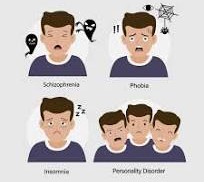Understanding Schizophrenia: A Deep Dive into the Mind


What is Schizophrenia and How Does It Affect People?
Have you ever wondered what it feels like to lose touch with reality? Schizophrenia is a chronic brain disorder that distorts the way a person thinks, feels, and behaves. It often leads to hallucinations, delusions, and severe disorganized thinking that can be extremely disabling.
- Schizophrenia affects approximately 1% of the global population.
- Symptoms typically begin in late adolescence or early adulthood.
- Without treatment, it can severely impact relationships, work, and daily functioning.
Early Signs and Symptoms of Schizophrenia
Recognizing schizophrenia early is crucial for effective intervention. The initial symptoms are often subtle and can easily be mistaken for typical adolescent behavior or stress reactions.
- Withdrawal from social activities and family.
- Difficulty concentrating and decline in academic or work performance.
- Suspiciousness or paranoia without reason.
- Emotional flatness or inappropriate emotional responses.
Causes and Risk Factors
While the exact cause of schizophrenia remains unknown, research points to a combination of genetic, biological, and environmental factors.
- Genetic predisposition plays a significant role.
- Imbalances in brain chemicals such as dopamine and glutamate are common.
- Prenatal exposure to viruses, malnutrition, or stressful life events may increase risk.
- Drug abuse, particularly during adolescence, can trigger symptoms in vulnerable individuals.
Types of Schizophrenia
Schizophrenia is not a one-size-fits-all diagnosis; it manifests differently across individuals. Understanding the various types can help tailor the appropriate treatment plan.
- Paranoid Schizophrenia: Dominated by delusions and auditory hallucinations.
- Disorganized Schizophrenia: Marked by disorganized speech and behavior.
- Catatonic Schizophrenia: Characterized by abnormal motor behavior, from complete stillness to excessive movement.
- Undifferentiated Schizophrenia: Symptoms that don’t neatly fit into other categories.
- Residual Schizophrenia: A past history of symptoms with some lingering effects.
How Schizophrenia is Treated
Managing schizophrenia usually requires a lifelong treatment plan, even when symptoms subside. Treatment approaches focus on minimizing symptoms and preventing relapses.
- Antipsychotic medications are the cornerstone of treatment.
- Psychosocial interventions, including therapy and supported employment, improve quality of life.
- Family education and support groups play a vital role.
- In severe cases, hospitalization may be necessary to ensure safety.
One commonly prescribed medication is Zyprexa (Olanzapine), which helps to balance chemicals in the brain, reducing hallucinations, improving mood, and making it easier for patients to function daily. Consistent medication management paired with therapy can lead to meaningful improvements.
Zyprexa (Olanzapine): A Reliable Treatment Option
Zyprexa (Olanzapine) has been widely recognized for its effectiveness in managing schizophrenia symptoms. It works by targeting neurotransmitters in the brain, particularly dopamine and serotonin, which are often imbalanced in individuals with schizophrenia. Patients taking Zyprexa have reported improvements in thinking, mood, and behavior. While it may cause some side effects such as weight gain or drowsiness, regular monitoring by healthcare providers can help manage these risks. Overall, Zyprexa provides a strong foundation for many patients to regain stability and improve their quality of life.
Living with schizophrenia is challenging, but with early diagnosis, effective treatment, and strong support networks, individuals can lead fulfilling lives. Breaking the stigma around mental illness and promoting understanding is essential in helping those affected find hope and healing. Recognizing the signs and encouraging treatment can truly change the course of someone's life.
Article Post: Editorial Team of RXShop.md
(Updated at Apr 26 / 2025)

